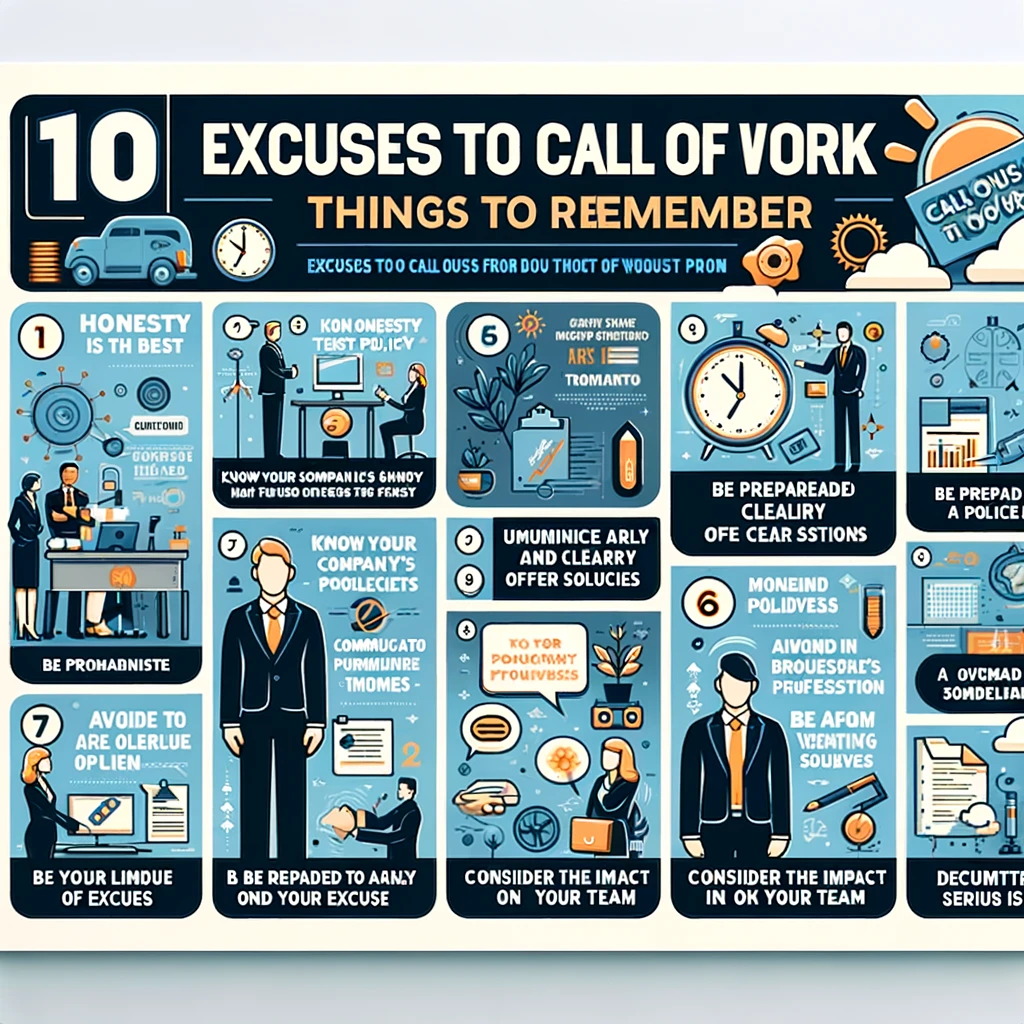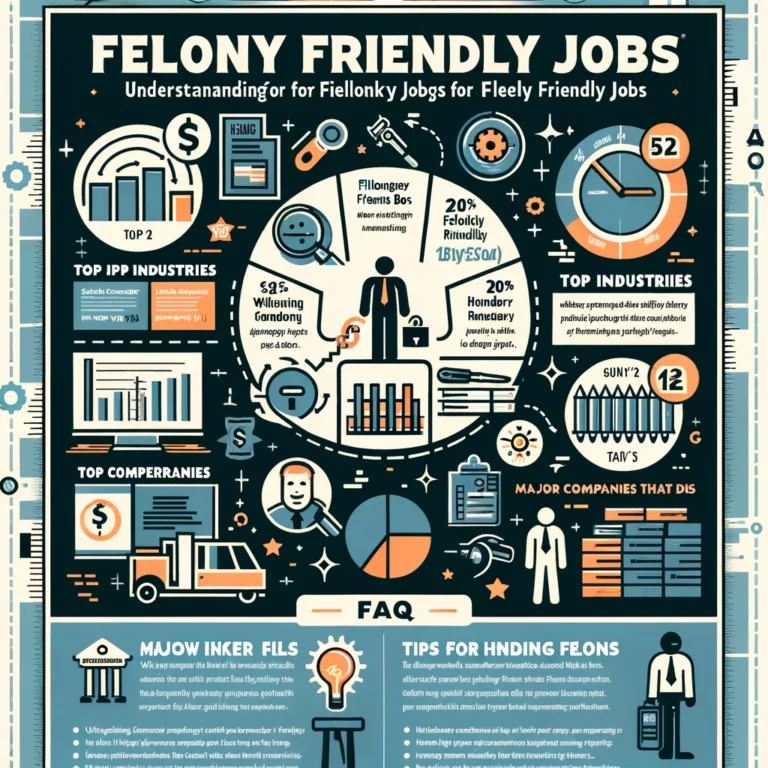Excuses to Call Out of Work
Table of Contents
- Introduction
- Why People Need Excuses to Call Out of Work
- Common Excuses to Call Out of Work
- 3.1. Illness
- 3.2. Family Emergency
- 3.3. Personal Issues
- 3.4. Mental Health Days
- 3.5. Car Trouble
- 3.6. Home Emergencies
- 3.7. Appointments
- 3.8. Weather Issues
- Creative Excuses to Call Out of Work
- 4.1. Pet Problems
- 4.2. Volunteer Work
- 4.3. Unexpected Delivery
- Bulletproof Excuses to Get Out of Work or Leave Early
- Informing Your Boss
- How to Craft a Believable Excuse
- Bad Excuses to Miss Work: What Not to Say
- Navigating Company Policies for Off Days
- FAQs About Excuses to Call Out of Work
- 10.1. What is the Best Excuse to Call Out of Work?
- 10.2. Can You Call Out of Work for Mental Health?
- 10.3. How Often Can You Use Excuses to Call Out of Work?
- 10.4. What Are the Risks of Using Excuses to Call Out of Work?
- Conclusion
1. Introduction
Excuses to call out of work are a necessary part of professional life. Whether it’s a sudden illness, an unexpected family emergency, or a mental health day, knowing how to effectively communicate these reasons is crucial. This guide will explore various excuses to call out of work, how to communicate them, and tips for ensuring your excuse is believable and acceptable.
2. Why People Need Excuses to Call Out of Work
Life is full of unpredictability, and sometimes, it becomes essential to call out of work. Understanding the reasons behind these excuses can help both employees and employers foster a more compassionate and flexible work environment. Common excuses to call out of work range from genuine health issues to personal emergencies that require immediate attention.
3. Common Excuses to Call Out of Work
3.1. Illness
Illness is one of the most common excuses to call out of work. Whether it’s the flu, a cold, or something more severe, health issues are legitimate reasons to stay home and recover.
3.2. Family Emergency
Family emergencies, such as a sick child, a spouse needing support, or a sudden event like a death in the family, are valid excuses to call out of work. These situations require immediate attention and are generally understood by employers.
3.3. Personal Issues
Personal issues, including dealing with a breakup, legal matters, or other stressful situations, can also be valid excuses to call out of work. It’s important to address personal well-being to maintain productivity in the long run.
3.4. Mental Health Days
Taking a mental health day is increasingly recognized as a legitimate excuse to call out of work. Mental health is crucial, and sometimes a day off is necessary to recharge and prevent burnout.
3.5. Car Trouble
Unexpected car trouble can be a reasonable excuse to call out of work, especially if there are no alternative transportation options available.
3.6. Home Emergencies
Home emergencies, such as a burst pipe, electrical issues, or other urgent repairs, require immediate attention and are valid excuses to call out of work.
3.7. Appointments
Pre-scheduled appointments, including medical, dental, or legal, are common excuses to call out of work. These appointments often can’t be rescheduled easily and need to be attended.
3.8. Weather Issues
Severe weather conditions can prevent safe travel to work, making it a valid excuse to call out of work. Safety should always come first.
4. Creative Excuses to Call Out of Work
4.1. Pet Problems
Pet emergencies, such as a sick pet or an urgent vet visit, can serve as creative and legitimate excuses to call out of work for pet owners.
4.2. Volunteer Work
Engaging in important volunteer work can be a noble and acceptable excuse to call out of work, demonstrating a commitment to community service.
4.3. Unexpected Delivery
Waiting for an important delivery that requires a signature can be a valid excuse to call out of work, especially if the delivery is time-sensitive and cannot be missed.
5. Bulletproof Excuses to Get Out of Work or Leave Early
- Illness: The classic go-to. Whether it’s a stomach bug or the flu, health issues are always a valid reason.
- Family Emergency: A sudden family emergency, like a sick child or a relative in need, is hard to argue against.
- Car Trouble: Unexpected car trouble is a plausible excuse, especially if you have no alternative transportation.
- Home Emergency: Issues like a burst pipe or electrical failure at home require immediate attention.
- Medical Appointment: Pre-scheduled medical or dental appointments are valid reasons to leave work early or not come in at all.
- Mental Health Day: Prioritizing mental health is important and increasingly recognized as a legitimate reason.
- Childcare Issues: If your regular childcare provider is unavailable, this can be a solid excuse.
- Pet Emergency: Similar to a family emergency, a sudden issue with a pet can require immediate attention.
- Jury Duty: Legally mandated, jury duty is a bulletproof excuse.
- Household Issues: Urgent repairs or maintenance tasks at home, like a broken furnace in the winter, are valid excuses.
- Work from Home: If something minor but urgent comes up, requesting to work from home can be a good compromise.
- Volunteer Commitments: Participating in significant community service events can be a valid reason.
- Weather Conditions: Severe weather that makes commuting dangerous is a valid excuse.
- Unexpected Delivery: A delivery requiring your presence can sometimes necessitate a day off.
- Legal Obligations: Any legal obligations, such as court appearances, are legitimate excuses.
6. Informing Your Boss
When informing your boss about your need to call out of work, it’s crucial to be clear and concise. Here’s how to do it effectively:
- Be Honest: Provide a truthful reason for your absence.
- Communicate Early: Notify your boss as soon as possible to allow them to make necessary arrangements.
- Offer Solutions: If possible, suggest how you can make up for the missed work or how others can cover for you.
- Keep it professional. Maintain a respectful and professional tone in your communication.
7. How to Craft a Believable Excuse
Crafting a believable excuse requires a balance of honesty and simplicity. Here are some tips:
- Stick to the Facts: Avoid elaborate stories that can easily be questioned.
- Be Consistent: Ensure your excuse aligns with any previous communications or actions.
- Avoid Over-Explaining: Keep your explanation simple and to the point.
- Be Prepared for Follow-Up Questions: Have basic details ready in case your boss asks for more information.
8. Bad Excuses to Miss Work: What Not to Say
Some excuses can do more harm than good. Avoid these bad excuses:
- Vague Reasons: “I don’t feel like coming in” is not acceptable.
- Overly Elaborate Stories: Highly detailed and convoluted stories can come off as suspicious.
- Frequent Use of the Same Excuse: Using the same excuse repeatedly can raise red flags.
- Blaming Others: Avoid excuses that blame coworkers or external factors that can easily be checked.
9. Navigating Company Policies for Off Days
Understanding your company’s policies for taking off days is crucial. Here’s how to navigate them:
- Review the Employee Handbook: Familiarize yourself with the policies regarding sick days, personal days, and other leave.
- Communicate with HR: If in doubt, ask HR for clarification on the policies.
- Keep Track of Your Days Off: Maintain a record of your used and available leave days.
- Plan Ahead: Whenever possible, plan your off days in advance and inform your boss early.
10. FAQs About Excuses to Call Out of Work
10.1. What is the Best Excuse to Call Out of Work?
The best excuse to call out of work is one that is truthful and justifiable, such as illness or a family emergency.
10.2. Can You Call Out of Work for Mental Health?
Yes, calling out of work for mental health reasons is increasingly accepted. Prioritizing mental health is important for overall well-being and productivity.
10.3. How Often Can You Use Excuses to Call Out of Work?
The frequency depends on your company’s policies and the nature of your job. It’s best to use excuses sparingly and only when genuinely necessary.
10.4. What Are the Risks of Using Excuses to Call Out of Work?
Using excuses too frequently or dishonestly can lead to mistrust, disciplinary actions, or even termination. It’s important to be honest and use excuses judiciously.
11. Conclusion
Having legitimate excuses to call out of work is essential for maintaining a healthy work-life balance. Whether it’s due to illness, family emergencies, or personal issues, it’s crucial to communicate your reasons effectively and honestly.




Leave a Comment